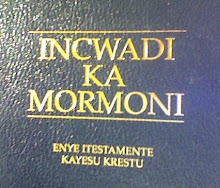Stocking books, learning languages.
1) What's the best way to obtain foreign-language Books of Mormon?
Depends on what you mean by "best". The easiest and quickest is buy them online at www.ldscatalog.com with your credit card. Look under "Missionary Book of Mormon".
If you want a tax deduction, you can include some money on the "Other" line on the donations slip that you use to pay tithes/donations. Next to "Other" you write "Ward BoM". Then you have to arrange with the ward clerk and Bishop for the clerk to use that money to buy the Books of Mormon through the Ward. They get shipped along with whatever stuff the Ward is ordering from the Distribution Center, and are usually sent to the Bishop's home. Then the clerk/bishop should give the material to you.
I checked with several sources, and that is 100% kosher, but it's likely that your Ward Clerk or Bishop may not be familiar with it.
To help the Clerk out, because he is not going to know the catalog # for all those foreign languages, get a blank order form from him (or photocopied from the catalog that was included in the November Ensign), and you fill out the Book of Mormon order for him, looking up the catalog #'s at www.ldscatalog.com.
Be careful on prices. The hardbacks are $2.50 and soft-covers are $2.00. Some languages come in one, some come in the other, some are in both.
Also good to order are the JS Testmony pamphlets. There are 30 more languages for those that don't have BoM's yet. Like Pashto. You have to order those by phone, because they aren't on the web site. To see what all languages are available, look under "Language Materials Listings" and there are like 4 or 5 pages of languages.
I ordered one each of all the "Language Material Listings". They're free. So when you place a phone/mail order you know the catalog # of the things that are not on the www.ldscatalog.com web site.
2) What languages are best to get for Bangladesh and Pakistan?
Bangladeshis speak Bengali and most also speak Hindi. There is a "Selections from the Book of Mormon" and JST pamphlet available in Bengali. Full BoM and JST pamphlet in Hindi.
If you want to be cool, pronounce it "ben-GOH-lee", instead of "ben-GAH-lee".
Pakistanis generally speak URDU, pronounced "oor-doo". Long "u" sound in both syllables, as in "tool".
There is both a "Selections from the Book of Mormon" and a JS Testimony pamphlet for Urdu.
Some Pakistanis also speak HINDI, but unless they were originally from India, they probably don't read Hindi, just speak it. A few Pakistanis also speak Pashto, and there is "Gospel Principles Simplified" and JST pamphlet in Pashto.
In Indianapolis, most of the taxi-drivers are African, from the countries of Ethiopia and Nigeria. Ethiopians speak AMHARIC (ahm-HAHR-ick), and there is a Book of Mormon in Amharic.
Nigerians generally speak either IGBO (EE-boo), or Yoruba (YOR-oo-bah), or Hausa (HOW-sah). There is a Book of Mormon in IGBO, but not in Yoruba or Hausa. However, there is "Gospel Principles Simplified" in Yoruba and Hausa.
The distribution center has Hausa Gospel Principles Simplified. But I bought the last Yoruba Gospel Principles Simplified. But if you need copies, I'll make copies and sell them to you at cost plus shipping.
West Africans generally speak French. But the church has many books in regional languages. Often they won't volunteer their regional or home language, so you have to ask them.
The church has JS Testimony pamphlets and Gospel Principles Simplified in many more arcane African languages: Wolof, Fon, Fulani (aka Fula), Bambara, Bemba, Somali, and more. I've given out books in all the above mentioned languages in Indianapolis.
If you get drivers from any one country on a regular basis, and want learn a few words in their language, get the "101 Languages" CD's. And learn a couple words in their language, like hello/goodbye, thank-you, you're welcome.
There's a competing product, which isn't as good in my opinion, but has some languages that aren't included in the previous CD package, called "Instant Immersion 102 Languages".
I ended up getting both because each has some lanaguages that the other doesn't have.
It can really brighten an immigrant's day to have someone say "thank you" or "you're welcome" to them in their native language.


0 Comments:
Post a Comment
<< Home